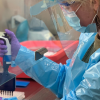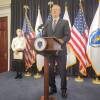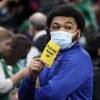Omicron is, apparently, everywhere — just in time for the holiday season. The variant has exploded in recent weeks, including here in Massachusetts, where it's now responsible for the majority of new COVID infections. People are worried about what it means for holiday travel and beyond. Dr. Bruce Walker, director of the Ragon Institute of Mass General Hospital at MIT and Harvard, joined Arun Rath on GBH’s All Things Considered to discuss how to mitigate risk for the holidays and why Walker believes the US is about to enter the most “severe phase of this pandemic thus far.”
Arun Rath: So let me just start off with a question that's on everyone's minds. Can we gather safely? Should we gather for the holidays?
More Local News
Dr. Bruce Walker: Well, there's a qualified answer to that. It depends on a person's level of willingness to take risk. There will always be a risk involved, but there are very clear measures one can take to mitigate that risk. Wearing masks, including wearing masks indoors — which I'm certainly tired of, and I'm sure everybody that's listening is tired of, but that is an important mitigation strategy. Distancing is another. Isolating, if you have symptoms, or keeping those that do have symptoms separate. Staying within bubbles and not going to places where there are huge crowds. Hand-washing and even just making sure that ventilation is appropriate, I think, are all important measures.
Rath: Can you talk about what people should be thinking about in terms of testing, if they are planning on traveling or seeing people over the holidays?
Walker: So another important thing — if people can access these and they're hard to get right now: the antigen tests that allow you to do immediate at-home testing are also something that can help to mitigate risk, by making sure that nobody who's actively infectious is joining the party. Those tests have been evaluated in terms of omicron, and they do seem to be quite effective in terms of detecting omicron.
Rath: Let's talk a bit more about what we know so far about omicron, because it does seem that every day we're learning more details. The first thing that we're hearing is that it does seem to be more contagious than than the previous strains.
Walker: I think there's no question that it's more contagious than other strains, that it is much more infectious, much more transmissible. It leads to greater numbers of secondary cases in households, that's been shown already. So it's something that has to be considered.
And I think something else to consider, again, as a mitigation measure, is to use one of the higher-quality masks. The KN94 or the N95 masks, which will give an additional level of protection.
Rath: And probably a good thing to think about as people may be getting in planes, trains and automobiles, right?
Walker: You know, in terms of planes, the bigger risk is at the airport as opposed to in the plane, which might seem counterintuitive. But in fact, the air exchange in airplanes is really enormous and the air is filtered. So leave your mask on in an airplane, but you're actually probably safer once you get in the airplane than you are in the airport itself.
Rath: Interesting. And on the other side of omicron, tell us a bit about what we know in terms of the illness it causes, the degree of illness and vaccine protection.
Walker: We don't yet know, fully, about the degree of severity because the severe cases and the severe disease and death lag is behind by a couple of weeks. Everything, though, that I've seen suggests that [omicron] is going to be less virulent, less disease causing, and that stems from the the data that have come out of South Africa and the data that are emerging from England, where the number of hospitalizations and the numbers of deaths are less than at a similar time in the delta wave that we've already been through. Too early to know for sure, but I think the majority of the data suggests that it's less disease causing.
But that doesn't mean it doesn't cause disease. There clearly have been deaths, but per the number of cases we've already seen, the number of deaths has been smaller than would have been anticipated. Breakthrough infections, there's no question that those are happening, but the vaccines are all holding their own in terms of preventing severe illness and death, and that is really encouraging news.
"I think that we are entering into what will end up being the most severe phase of this pandemic thus far, just in the sheer number of cases."
Rath: We have now the news of the day and the week: the City of Boston is now set to require proof of vaccination at restaurants and other indoor businesses starting next month. And it looks like maybe other Massachusetts cities might be following suit. How do you think about that in terms of a mitigation measure?
Walker: I think that we are entering into what will end up being the most severe phase of this pandemic thus far, just in the sheer number of cases. Even if a smaller percentage of people end up in the hospital, the sheer numbers mean that the magnitude of hospitalizations will increase. So any mitigation measures that can be taken, I think, are important — and I think, unfortunately, people are still so fatigued with having to deal with this pandemic, that they're not really cognizant of the fact that that we have this new wave, which is coming on ferociously.
Rath: Speaking of being fatigued, I can only imagine how people who work in health care like yourself are feeling at this point. But you are actually having to think about, you know, the logistics of how we're going to handle this once again. Could you talk a little bit about how local hospitals are preparing? Right now, we heard about just today that Gov. Charlie Baker was going to put the National Guard in to help at hospitals.
Walker: You know, the bottom line is that the health care workers are just really fatigued from this and really overworked. And a lot of the health care force is likely to end up unable to work because they themselves will be infected. So this is a huge problem facing us, and I applaud Gov. Baker for calling out the National Guard to help us get through this. We will have a lot more work than can be done by the number of people that we have available during the initial wave in Massachusetts. Those of us that were not actively working in the hospital, including the researchers at Mass. General, ended up actually helping out in the hospital, and I suspect that that will happen again this time. So we should be preparing for a real burden of disease coming upon us, with this tsunami that's coming along.
Rath: As we're facing that, I know a lot of people are feeling the sense that this feels a little bit like March of 2020 all over again, and trying to balance the sense of, “Well, we kind of know what we're dealing with, we know how to wear masks and socially distance and do these things.” But, again, balancing that with just really feeling overwhelmed. How are you looking at this now?
"We may actually be turning the corner a bit in terms of our ability to cohabitate with this virus."
Walker: I mean, I think there's bad news, which is that cases are skyrocketing, but there is good news out there as well. And that is that the new drugs are on the horizon — those look like they will be very effective against omicron. The vaccines are still protecting. We're anticipating less severe disease. It's still early days, but we anticipate less severe disease.
And what the data that I've seen actually give me reason to be encouraged that we may actually be turning the corner a bit in terms of our ability to cohabitate with this virus — this virus in its many incarnations. And the reason I say that is that the the case fatality rate, the number of people that die per number that get infected, has progressively diminished. And my reading of that — at least one credible hypothesis — is that we're gradually, either through infection or through vaccination or, really, a combination of the two, getting to the point where we have some underlying immunity. And it's actually interestingly, probably, not so much the antibodies, but another arm of the immune response T cells that are diminishing the severity of disease.
And my hope is that we will get to the point where, for the most part, this is much more like an influenza-like illness, where, in the best of circumstances, one feels that they have a mild cold and then can move on from that.











